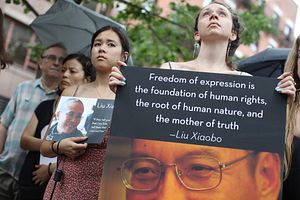During President Xi Jinping’s marathon speech at the 19th National Congress of the Chinese Communist Party, one message stood out: China is entering “a new era” as a great power, “moving closer to the center stage” of international politics. With the liberal West meanwhile mired in a prolonged leadership crisis, what are we to expect as China asserts itself on the international stage? If the recent past is any guide, at least one thing is abundantly clear: Western countries will be unwilling to challenge China on its core interests, notably including Beijing’s insistence on non-interference in its domestic affairs.
Outside the limelight of international media attention, a Danish investigative commission is currently finalizing a report about the violation of Danish citizens’ constitutional rights back in July 2012, when then-Chinese President Hu Jintao visited Denmark. Eager to make sure that their high-ranking guest would not “lose face” in any way, local police forces staged a clampdown on peaceful demonstrators to prevent them from manifesting their critical views. Along the route that took Hu’s motorcade through the streets of Copenhagen, pro-Tibetan activists either had their banners confiscated by the police or were physically blocked by law enforcement vehicles.
That the police operation violated the constitutional right to freedom of expression is beyond dispute. What has been less clear, however, is whether local Danish police authorities acted on their own initiative or were somehow orchestrated from above. No matter what conclusion is reached by the investigative commission, set up in 2015 by the Lars Løkke Rasmussen government, the overall lesson should be clear: China’s ever-growing economic and political clout makes its smaller trading partners go to great lengths to cater to Beijing’s core interests.
In late 2016, another Scandinavian country finally learned this lesson after six years of frosty political relations with Beijing. Following the award of the Nobel Peace Prize to Chinese dissident and human rights activist Liu Xiaobo, Beijing subjected Norway to a comprehensive political boycott, demanding an official apology from the Norwegian government, regardless of the fact that the Nobel Prize Committee runs its affairs independently of national politics. In the end, Norway and China issued a blatantly one-sided “joint” declaration, in which Oslo not only pledged to attach “high importance to China’s core interests and major concerns,” but also “to do its best to avoid any future damage to their bilateral relations.”
While the Scandinavians are known to be stout and activist proponents of human rights and liberal democracy, they are, after all, minor actors on the international stage. Yet, even major European powers like the U.K. and France have in recent years deferred to Beijing’s political interests to avoid putting their economic ties with China at risk. For instance, following harsh Chinese criticism of previous visits by the Dalai Lama, the Tibetan spiritual leader is no longer officially welcomed in 10 Downing Street, in the Elysée Palace – or in any other European capital, for that matter.
Instead, over the past couple of decades western European countries have seen parallel adjustments of their bilateral relations with Beijing. While back in the 1990s European leaders were condemning China’s appalling human rights record through public megaphone diplomacy, by the 2000s they had become far more wary and selective in their criticism. The Tibetan cause still attracted some sympathy, but the broader critical dialogue on human rights was conveniently “outsourced” to the European Commission or local NGOs like national human rights institutes. Today, the bilateral critical dialogue is, at best, relegated to non-public ritual exchanges at ministerial meetings.
On February 27, 11 Western embassies in Beijing signed on to a joint letter expressing concern over recent reports of torture and other inhumane treatment of Chinese human rights lawyers and activists. Tellingly, the letter was submitted quietly to the Chinese government to avoid any public media campaign that would have a stigmatizing effect on China in international society. Even worse, only seven of the 28 EU member states were willing to put their signatures on the letter. Indeed, it speaks volumes that signing on to such a diplomatic admonishment is viewed as highly controversial despite the growing pile of evidence that civil liberties are being systematically eroded under Xi Jinping.
As China has risen through the ranks of international society to become the world’s second largest economy and largest trading nation, few Western governments are willing to lock horns with China’s leaders. For some years now, the United States has more or less single-handedly spoken out publicly against the Chinese regime for its human rights violations. However, with Donald Trump at the helm in the White House, the lingering question is: Will anyone stand up to China?
In March, when the U.S. State Department issued its annual report on the human rights situation in China, Secretary of State Rex Tillerson, unlike his predecessors, did not hold a press conference. Nor did the Trump administration in February choose to join the 11 Western countries as a signatory to the diplomatic letter criticizing the Chinese government. In fact, given his soft spot for strongmen and his public toying with the idea of reintroducing torture techniques, no one expects Donald Trump to urge Xi Jinping to respect human rights.
The disturbing bottom line seems to be that for the first time in recent history, authoritarian great powers like China will have a free rein. What remains to be seen is the extent to which Xi will exploit the new illiberal international landscape to curtail civil liberties at home – and even abroad as an increasingly powerful China expands its core interests. Hopefully, now is the time for Europe to wake up and take responsibility in actively defending our liberal order against the rise of authoritarianism.
Andreas B. Forsby is a researcher, Ph.D., at the Danish Institute for International Studies.

































